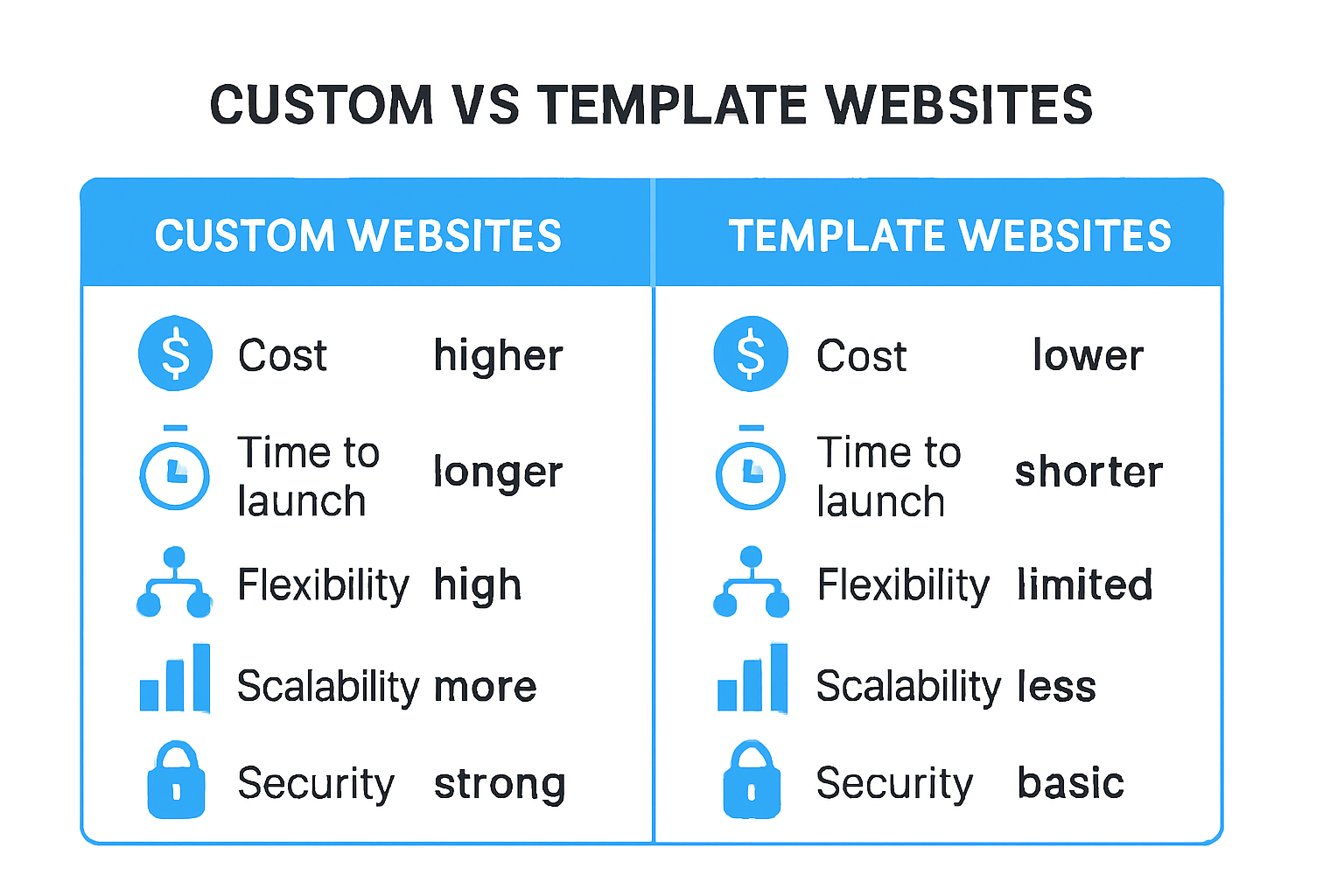Choosing between a custom website and a template has become one of the biggest digital decisions for South African businesses. Most people assume templates win because they launch up to 90 percent faster and cost less than R5,000. But that headline-saving choice could actually cost you much more down the line, because a custom website is where brands unlock real security, flexibility, and future-proof performance.
Table of Contents
- Understanding Custom Websites And Templates
- Comparing Costs And Time To Launch
- Flexibility, Security And Scalability Considerations
- Choosing The Right Approach For Your Business Goals
Quick Summary
| Takeaway | Explanation |
|---|---|
| Custom Websites Offer Tailored Solutions | Custom websites are specifically designed to meet unique business needs, enhancing brand differentiation and optimizing user experiences compared to template sites. |
| Cost and Time Considerations | Custom site development is significantly more expensive (R50,000 to over R150,000) and time-consuming (3-6 months) than template solutions (R750 to R5,000 and 1-4 weeks), impacting projects based on budget and urgency. |
| Security and Scalability Advantages | Custom websites provide enhanced security through bespoke protocols and better scalability, allowing businesses to adapt and grow without extensive redesigns. |
| Strategic Alignment is Crucial | When choosing a web development approach, it’s essential to align the digital strategy with broader business objectives to ensure long-term growth and competitive advantage. |
| Future-Proofing with Custom Development | Custom sites allow for flexible architecture and modular updates, making them better suited for evolving business needs and technological advancements. |
Understanding Custom Websites and Templates
Web development has transformed dramatically, presenting businesses with critical choices about their online presence. The fundamental decision between a custom website and a template represents more than just a technical selection - it’s a strategic investment that impacts brand identity, user experience, and long-term digital performance.
The Core Differences in Web Development Approaches
At its essence, a custom website is a purpose-built digital solution crafted specifically for a business’s unique requirements. Unlike templated websites, which offer pre-designed frameworks, custom websites are meticulously engineered to align precisely with an organisation’s brand, functionality needs, and strategic objectives.
According to a conference paper from Georgia Southern University, custom websites provide enhanced brand differentiation and can be optimised for unique user journeys. The research highlights that while templates offer accessibility, custom solutions deliver superior marketing and usability outcomes for businesses seeking distinctive digital experiences.

Technical and Strategic Implications
Templated websites typically come with predefined structures and limited customisation options. They represent a quick, cost-effective solution for businesses needing an immediate online presence. However, they often compromise on unique branding, performance optimization, and scalability.
Custom websites, by contrast, offer comprehensive control. Developers can:
- Integrate advanced functionality tailored to specific business processes
- Optimize performance for precise computational demands
- Ensure seamless user experiences across multiple devices and platforms
- Build robust security frameworks specific to the organisation’s requirements
The Web Accessibility Initiative emphasizes that truly effective websites must go beyond aesthetic considerations, focusing on creating inclusive, intuitive digital experiences that serve diverse user needs.
For South African businesses navigating a competitive digital ecosystem, understanding these nuanced differences becomes crucial. A custom website isn’t merely a digital brochure - it’s a strategic asset that can differentiate an organisation, enhance user engagement, and drive meaningful business outcomes.
The choice between custom development and template adoption ultimately depends on multiple factors: budget constraints, technical complexity, brand positioning, and long-term digital strategy. While templates offer immediate accessibility, custom websites provide the flexibility and precision required for businesses aiming to create truly transformative online experiences.
Comparing Costs and Time to Launch
In the digital development landscape, businesses face a critical decision that balances financial investment, time constraints, and strategic objectives. The choice between custom websites and templates involves more than just aesthetic considerations - it’s a complex calculation of resources, potential returns, and long-term business goals.
Financial Investment Breakdown
According to Search Engine Journal, custom website design costs can range significantly from R50,000 to over R150,000, depending on the project’s complexity. Template-based solutions offer a stark contrast, with prices typically ranging from R750 to R5,000 for premium options.
Cost Considerations Include:
- Development Time: Custom sites require extensive professional hours
- Complexity of Features: More advanced functionality increases price
- Design Specificity: Unique branding elements impact overall investment
- Ongoing Maintenance: Custom sites often need more specialized support
To help visualise the financial and timeline differences between custom websites and template sites, the following table summarises the main details highlighted in this section.
| Website Type | Typical Cost (ZAR) | Launch Timeline | Suitable For |
|---|---|---|---|
| Template Website | R750 – R5,000 | 1–4 weeks | Quick launches, small businesses |
| Custom Website | R50,000 – R150,000+ | 3–6 months (up to 9 months for complex) | Bespoke needs, growth-focused, enterprise |
Launch Timeline Dynamics
Slider Revolution highlights the substantial difference in development timelines. While template websites can be operational within days or weeks, custom websites may require several months of planning, design, and implementation.
Typical timeline comparisons reveal:
- Template Websites: 1-4 weeks from concept to launch
- Custom Websites: 3-6 months for comprehensive development
- Complex Custom Projects: Up to 9 months for intricate enterprise solutions

Strategic Decision-Making Factors
The decision extends beyond immediate costs. Full Stack Industries emphasizes that businesses must consider long-term strategic alignment. While templates provide rapid deployment and cost-effectiveness, custom websites offer unparalleled flexibility and brand-specific functionality.
For South African businesses, this choice represents a nuanced balance between budget constraints and digital ambitions. Smaller enterprises might find templates an ideal starting point, whereas established organisations requiring complex digital ecosystems will likely benefit from custom development.
Ultimately, the optimal solution depends on specific business requirements, growth projections, and the desired digital experience. Careful evaluation of immediate needs versus long-term potential will guide organisations towards the most appropriate web development strategy.
Flexibility, Security and Scalability Considerations
In the digital ecosystem, a website is more than a visual interface - it’s a critical business infrastructure that demands robust performance, adaptability, and protection. The choice between custom websites and templates significantly impacts an organisation’s ability to evolve, secure sensitive data, and respond to changing market dynamics.
Architectural Flexibility and Future-Proofing
According to The E Digital, custom websites provide unparalleled flexibility, enabling businesses to add new features and functionalities seamlessly as they grow. Unlike template-based solutions with rigid structures, custom development allows for modular design approaches that anticipate future technological shifts.
Key Flexibility Advantages Include:
- Modular Architecture: Easy integration of new components
- Customised User Journeys: Tailored navigation and interaction flows
- Adaptable Design Systems: Responsive across emerging technological platforms
Security and Vulnerability Management
Search Engine Journal emphasizes that custom websites offer enhanced security by enabling personalized protection mechanisms. Template websites often present broader vulnerabilities due to standardised code accessible to potential cyber threats.
Custom development allows for:
- Bespoke Security Protocols: Tailored protection strategies
- Reduced Attack Surface: Minimised standardised vulnerability points
- Continuous Security Updates: Proactive threat management
Scalability and Performance Optimization
Begin With B highlights that custom web designs are constructed with scalability as a foundational principle. This approach ensures businesses can expand digital capabilities without requiring complete system redesigns.
Scalability considerations encompass:
- Computational Resource Management: Efficient handling of increased traffic
- Database Optimization: Seamless data handling and storage expansion
- Performance Monitoring: Real-time insights into system capabilities
For South African businesses operating in a dynamic digital environment, these considerations are not theoretical abstractions but practical necessities. A website represents more than a digital presence - it’s a strategic asset that must evolve alongside organisational ambitions.
The investment in a custom website transcends immediate functionality. It represents a commitment to technological agility, robust security, and strategic digital positioning. While template solutions offer quick deployment, custom development provides a comprehensive, future-oriented digital strategy that can adapt, protect, and propel business growth.
The following table provides a side-by-side summary of key differences in flexibility, security, and scalability between custom websites and template sites, making it easier to compare these crucial aspects.
| Aspect | Custom Website | Template Website |
|---|---|---|
| Flexibility | Modular, highly customisable, adapts with growth | Limited to preset options, rigid structure |
| Security | Bespoke protocols, reduced vulnerabilities | Standard code, more common vulnerabilities |
| Scalability | Engineered for expansion, performance optimised | Harder to scale, may require full rebuild |
Choosing the Right Approach for Your Business Goals
Selecting the appropriate web development strategy represents a pivotal decision that can profoundly impact a business’s digital effectiveness and growth trajectory. The choice between custom websites and templates demands careful consideration of multiple strategic factors beyond mere technical specifications.
Aligning Digital Strategy with Business Objectives
Research Gate highlights that template websites often present significant limitations for businesses with unique operational requirements. While convenient, these pre-designed solutions can restrict a company’s ability to create truly differentiated digital experiences.
Strategic Alignment Considerations:
- Brand Representation: Ability to authentically reflect organisational identity
- Functional Complexity: Match technological requirements with development approach
- Growth Potential: Capacity for future digital transformation
Performance and Competitive Differentiation
Search Engine Journal emphasizes that custom websites offer superior opportunities for competitive differentiation. These tailored solutions enable businesses to craft unique user experiences that distinguish them within crowded digital marketplaces.
Key Performance Dimensions Include:
- Unique User Experience: Customised interaction pathways
- Advanced Functionality: Specialized features aligned with business processes
- Performance Optimization: Targeted computational efficiency
Long-Term Digital Investment Strategy
Digital Silk underscores that web development represents a strategic investment rather than a transactional expense. Custom websites provide a robust foundation for businesses seeking comprehensive digital transformation.
For South African enterprises navigating complex technological landscapes, this decision transcends immediate aesthetic considerations. It involves evaluating current operational needs while maintaining flexibility for future digital evolution.
Small businesses might initially benefit from template solutions, offering rapid deployment and cost-effectiveness. However, growing organisations requiring sophisticated digital infrastructure will find custom development increasingly critical.
The optimal approach depends on multiple interconnected factors: budgetary constraints, technological complexity, brand positioning, and anticipated growth trajectories. Businesses must conduct thorough assessments, considering not just immediate requirements but potential future digital strategies.
Ultimately, successful digital presence emerges from strategic alignment between technological capabilities and organisational vision. Whether choosing a template or custom solution, the paramount goal remains creating a digital platform that effectively communicates, engages, and drives meaningful business outcomes.
Frequently Asked Questions
What is the main difference between a custom website and a template?
A custom website is specifically designed to meet the unique needs of a business, offering tailored solutions and enhanced user experiences, while a template website uses pre-designed frameworks that may compromise branding and functionality.
How much does a custom website cost compared to a template?
Custom websites typically range from R50,000 to over R150,000, whereas template websites usually cost between R750 to R5,000, making templates a more cost-effective option for small or quick projects.
How long does it take to launch a custom website versus a template?
Launching a template website can take about 1 to 4 weeks, whereas a custom website may require 3 to 6 months for comprehensive development, depending on the project’s complexity.
What are the security advantages of a custom website?
Custom websites provide enhanced security through bespoke protection mechanisms, reducing common vulnerabilities associated with standard template codes, which are more accessible to potential cyber threats.
Ready to Future-Proof Your Website and Stand Out?
Are you struggling with the choice between a custom website and a template, knowing that every decision could shape your business’s digital future? The article highlighted how speed and cost often tempt businesses towards templates, yet those options can lead to lost opportunities, weaker security, and limited brand identity. At Cloudfusion, we understand the unique pressures South African businesses face, from tight budgets to the need for exceptional online experiences.
Move beyond short-term choices. Custom web development is about securing your long-term growth with greater flexibility, seamless scalability, and real protection for your brand. If you’re aiming for genuine differentiation and want your digital investment to support your success for years to come, let’s help you align your strategy. Get a personalised Web Design and Development Quotation today or explore more about our tailored solutions at Cloudfusion and discover how your business can gain a real competitive edge. Now is the moment to invest in a secure, scalable digital presence that truly represents your brand.








